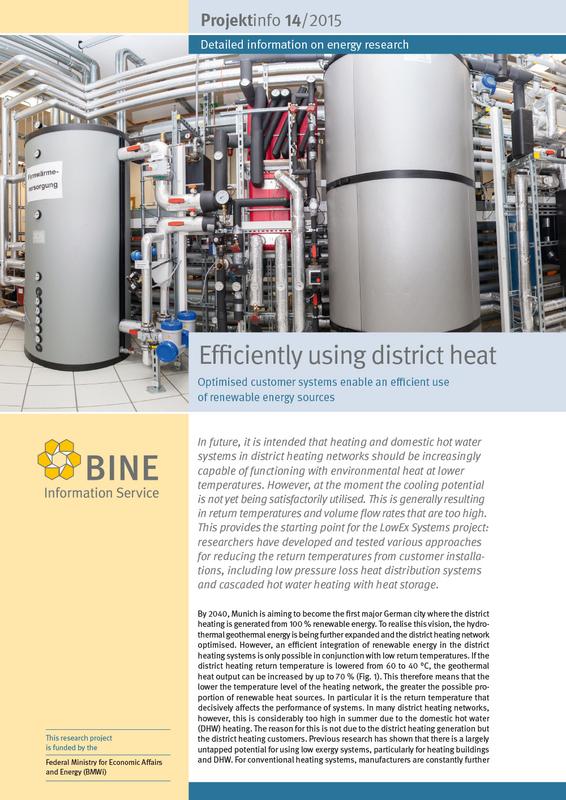
Efficient Renewable Energy Use in Heating Networks

The BINE-Projektinfo brochure “Efficiently using district heating” (14/2015)
Lowering return temperatures and optimising customer systems
More efficient domestic hot water heating is a central starting point. In heating networks, domestic hot water (DHW) heating is in itself insufficient to adequately reduce the return temperature during the summer months.
Measurements in eight apartment buildings and a terraced house complex showed that the bulk of the heat consumed is used for reheating the circulating drinking water.
The primary heating of the cold water plays a minor role. In order to obtain lower return temperatures when heating the domestic hot water, storage tanks have to be integrated into the system to temporarily store the residual heat from the circulation pipes.
This enables a gradual heating process. Seven district heating transfer stations have been developed with different DHW systems for different building types and for both summer and winter requirements, and evaluated on a test rig. Three systems enabled return temperatures lower than 35 °C to be achieved.
This LowEx Systems research project is a collaboration between the Stadtwerke München municipal utility company, Munich University of Applied Sciences and the Ebert-Ingenieure building services engineering company.
The investigations were carried with a view to Munich’s plans to use only renewable energy for district heating provision by the year 2040.
You found all informations about the BINE Projektinfo brochure “Efficiently using district heating” (14/2015) here:
http://www.bine.info/en/press/press-releases/press/pressemitteilung/erneuerbare-…
Uwe Milles/Birgit Schneider
presse(at)bine.info
About BINE Information Service
Energy research for practical applications
The BINE Information Service reports on energy research topics, such as new materials, systems and components, as well as innovative concepts and methods. The knowledge gained is incorporated into the implementation of new technologies in practice, because first-rate information provides a basis for pioneering decisions, whether in the planning of energy-optimised buildings, increasing the efficiency of industrial processes, or integrating renewable energy sources into existing systems.
About FIZ Karlsruhe
FIZ Karlsruhe – Leibniz Institute for Information Infrastructure is a not-for-profit organization with the public mission to make sci-tech information from all over the world publicly available and to provide related services in order to support the national and international transfer of knowledge and the promotion of innovation.
Our business areas:
• STN International – the world’s leading online service for research and patent information in science and technology
• KnowEsis – innovative eScience solutions to support the process of research in all its stages, and throughout all scientific disciplines
• Databases and Information Services – Databases and science portals in mathematics, computer science, crystallography, chemistry, and energy technology
FIZ Karlsruhe is a member of the Leibniz Association (WGL) which consists of 87 German research and infrastructure institutions.
http://www.bine.info/en – BINE Informationsdienst












